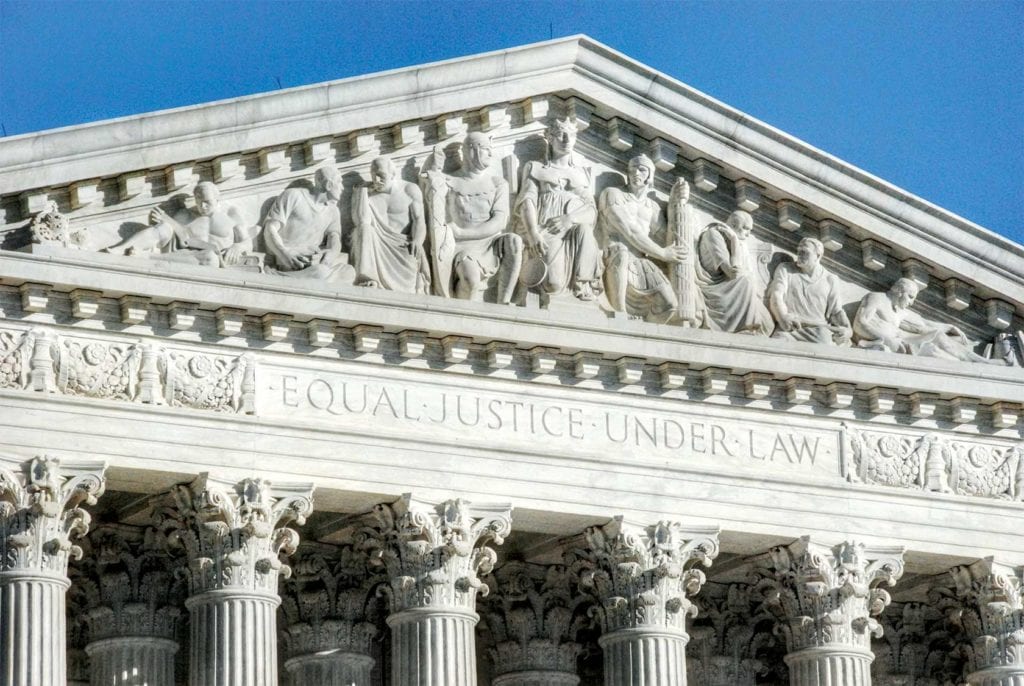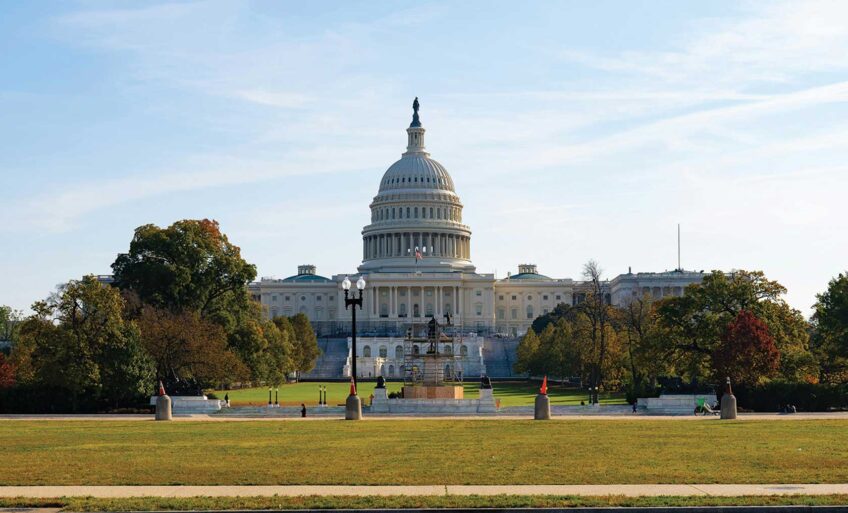Rights groups oppose Supreme Court nominee
Nation’s diversity is not reflected in composition of its highest court

One of the most consequential decisions that presidents make are lifetime federal judicial appointments at every level: circuit, appellate and the U.S. Supreme Court. The independent federal judiciary is charged with ensuring that the nation’s courts are fair to all people. Even the phrase “equal justice under law” is carved in the stone façade of the Supreme Court building.
A recent American Bar Association blog states, “For the nation to continue to have trust in the integrity and independence of the federal judiciary, the process that places judges on the bench must be viewed as fair, unhurried and unbiased.”
But for Black America and other communities of color, throughout our history and continuing even today, ‘justice’ is often far from fair, nor is it unbiased. In recent years, the Supreme Court has declared that corporations should be treated like people, and that voting rights no longer need to be protected. In November, the high court is scheduled to revisit the Affordable Care Act, also known as Obamacare.
Other issues that may reach the Supreme Court could include whether federal agencies can preempt state laws protecting consumers from bad actors in the student loan servicer arena, and in payday, auto-title and high-cost installment loans. Even the nation’s half-century-old Fair Housing Act could be revisited, due to the Trump Administration’s roll-back of an Obama-era fair housing rule known as disparate impact. If allowed to stand, the burden of proving discrimination will be shifted to consumers instead of powerful corporations and others alleged to have violated the law.
“Over the next several years, the Supreme Court will make important and lasting decisions that affect every facet of our lives, including income inequality, the racial wealth gap, access to health care — including reproductive rights — and many other issues,” states a new Center for Responsible Lending policy brief.
For these reasons and others, the passing of Justice Ruth Bader Ginsburg created a significant moment for the future of the court. As the second woman to ever serve as a Supreme Court Justice, the fondly-recalled “Notorious RBG” broke gender barriers throughout her legal career, forging freedom and access for many who were historically marginalized.
The nomination of Judge Amy Coney Barrett to fill that vacancy has triggered a chorus of civil rights organizations expressing their adamant opposition. As a former clerk to Justice Antonin Scalia in 1998-1999, Barrett has frequently lauded him as her mentor and praised his judicial philosophy both as a law school professor and as a judge.
At the September 26 White House Rose Garden announcement of her nomination, Barrett said, “I clerked for Justice Scalia more than 20 years ago, but the lessons I learned still resonate. His judicial philosophy is mine too: A judge must apply the law as written. Judges are not policymakers, and they must be resolute in setting aside any policy views they might hold.”
Despite high praise by conservatives and the Senate majority’s commitment to ram through her nomination, civil rights organizations and other advocates have expressed strong opposition to Barrett.
“We stand opposed to her confirmation to the Court,” said Kristen Clarke, president and executive director of the Lawyers’ Committee for Civil Rights Under Law. “Her confirmation would dramatically alter the Supreme Court in ways that would prove devastating for Black communities and other people of color across the country.”
Similarly, the head of the nation’s largest and oldest civil rights organization recently advised the Senate Judiciary Committee of the NAACP’s position on the nomination.
“Coming in the middle of a presidential election in which over seven million people have already voted, the Barrett nomination is as illegitimate as it is corrupt,” wrote Derrick Johnson, NAACP President and CEO to the Judiciary Committee. “On issue after issue, we have found her to be stunningly hostile to civil rights.”
“Early and absentee votes are already being cast for the November election — and nominating a candidate for a lifetime appointment to this nation’s highest court during this electoral period undermines the democratic process and is a disservice to the American public,” said Sherilynn Ifill, president and director-counsel of the NAACP Legal Defense and Educational Fund. “Senators must also respect the clear will of the American people, and honor the precedent they set in 2016, by declining to consider any nominee until the winner of the presidential election is inaugurated.”
Mike Calhoun, president of the Center for Responsible Lending, said, “The Senate majority needs to prioritize COVID-19 relief legislation for the rest of this year and not use the remaining time of this session to confirm judicial nominees, leaving millions of Americans vulnerable to financial hardship.”
With less than three weeks before election day, the Senate began the confirmation process on Monday, Oct. 12 with its Judiciary Committee hearings, chaired by Senator Lindsey Graham of South Carolina. The committee is expected to vote on the nomination on Oct. 22. As Senate majority leader, Kentucky Sen. Mitch McConnell is planning a floor vote for the week of Oct. 26.
The rapid review of Barrett is a stark contrast to the lengthy, Senate-engineered delay of President Obama’s 2016 election year Supreme Court nomination.
On Feb. 13, 2016, Associate Supreme Court Justice Antonin Scalia passed. Weeks later, on March 16, 2016, President Obama nominated Judge Merrick Garland, chief judge of the U.S. Court of Appeals for the District of Columbia Circuit.
But the U.S. Senate refused to hold committee hearings or a floor vote for almost a year, and thereby denied President Obama the right to fill the court vacancy. Senate Majority Leader Mitch McConnell publicly boasted in a speech that August, “One of my proudest moments was when I looked Barack Obama in the eye and I said, ‘Mr. President, you will not fill the Supreme Court vacancy.’”
Nearly a year later, the lengthy high court vacancy enabled President Trump to nominate Neil Gorsuch on Feb. 1, 2017. The Senate confirmed Gorsuch on Friday, April 7, 2017 and he was sworn in the following Monday, April 10. In real time, that nomination process took just two months.
It is also noteworthy that as the nation is increasingly diverse, the federal bench remains dominated by white judges.
A recent Associated Press analysis of the Trump Administration’s judicial appointments found that white men made up nearly 86% of the 206 lifetime appointments made. Similarly, 85% of all Senate-confirmed U.S. Attorneys were white men.
A court system that does not reflect the people it is sworn to protect is hard-pressed to ensure diverse backgrounds, experiences and viewpoints in judicial deliberations. Continuing the trend of nominating and confirming white, conservative justices strains — if not ignores — the nation’s pledge of equal justice.
In the words of the Leadership Conference on Civil & Human Rights, “During this pandemic and amid nationwide calls for racial justice, we cannot allow Trump to select a third justice who he has pledged will devastate our hard-fought civil and human rights — including access to health care for millions of people.”
The approaching electoral decisions include the future of hard-won civil rights and whether they will continue to be systematically dismantled. It is in the hands of voters to decide. And the choices should be clear: a return to the multiple ills of bygone years, or a hopeful future with justice and opportunity for all.
Choose wisely, America.
Charlene Crowell is a senior fellow with the Center for Responsible Lending.






